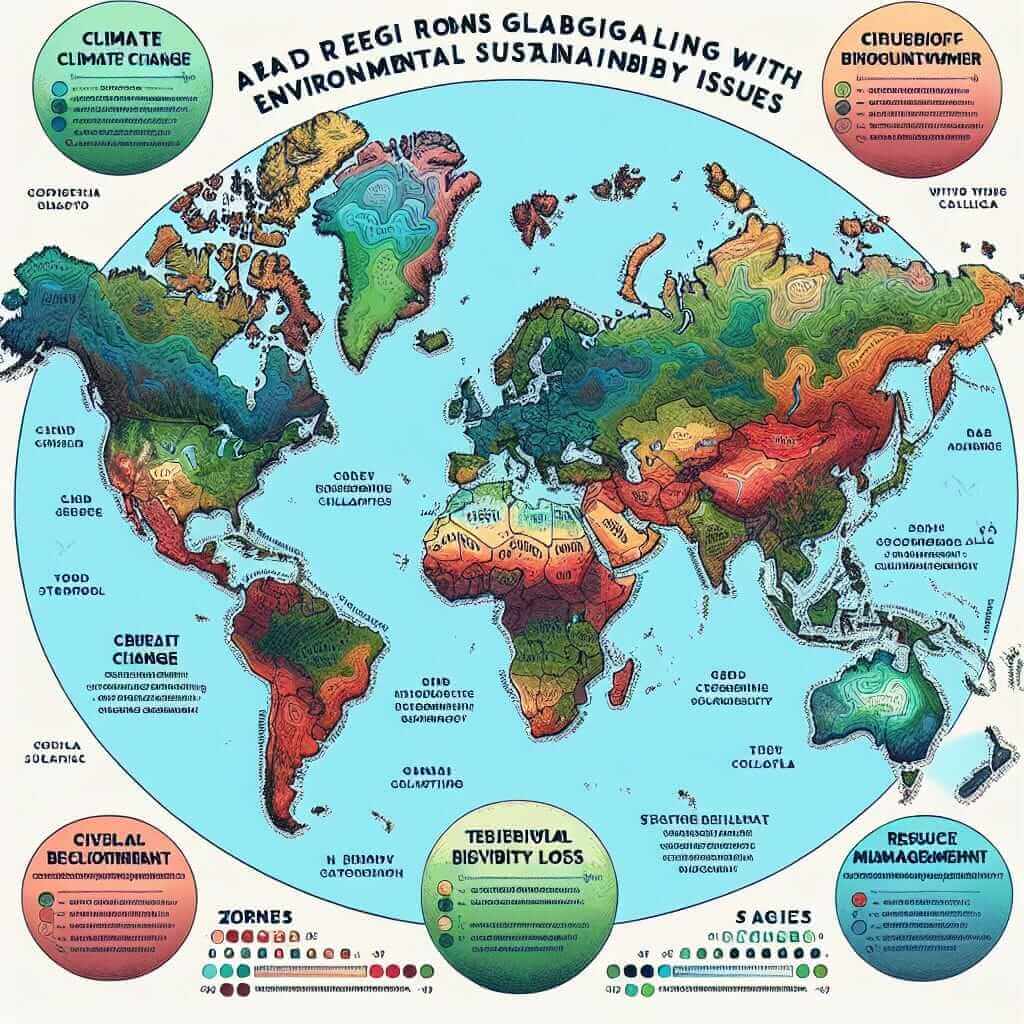The IELTS Reading section evaluates your comprehension and ability to interpret complex texts on various topics. One recurring theme in IELTS Reading passages is environmental sustainability, a globally relevant issue. This article will explore the challenges of managing global environmental sustainability through a detailed, practice IELTS Reading passage, including questions, and answer keys. Additionally, we will provide helpful tips and vocabulary to enhance your preparation.
Introduction
The IELTS Reading section consists of 40 questions, requiring you to read three passages and answer a variety of question types. Environmental sustainability is a frequent topic due to its global importance. Historically, texts related to this topic have appeared multiple times in IELTS exams, illustrating their relevance and significance. This makes it vital for candidates to familiarize themselves with this subject.
Engaging with topics like “What are the challenges of managing global environmental sustainability?” prepares you for potential questions and helps you gain insights into contemporary global issues.
Practice IELTS Reading Passage
The Challenges of Managing Global Environmental Sustainability
Environmental sustainability involves strategies and actions that aim to meet human needs without compromising the health of ecosystems or the ability of future generations to meet their needs. Despite global awareness, numerous challenges hinder the attainment of environmental sustainability globally.
Key Challenges
-
Political and Economic Constraints
Governments and international organizations often face difficulties finding a balance between economic growth and environmental preservation. Policies aimed at reducing carbon emissions can conflict with economic interests, hindering implementation. -
Technological Limitations
Advanced technologies for clean energy and waste management exist but are often prohibitively expensive for widespread use, particularly in developing countries. This inequality in technology access exacerbates global environmental issues. -
Societal Attitudes
Public perception and behavior towards environmental conservation play a crucial role. In some regions, there is a lack of awareness or interest in sustainable practices, which can impede progress. -
Resource Management
Efficiently managing natural resources like water, forests, and minerals is crucial yet challenging. Over-exploitation and mismanagement lead to resource depletion and ecological degradation. -
Climate Change
Climate change poses a significant threat to global sustainability. Extreme weather events, rising sea levels, and changing weather patterns affect agriculture, water supplies, and natural habitats. -
Biodiversity Loss
Human activities have led to the extinction of species at an alarming rate. Biodiversity is essential for ecosystem balance and resilience, and its loss threatens global environmental stability.

Questions: Managing Global Environmental Sustainability
Read the passage above and answer the following questions:
Multiple Choice
-
Which of the following is NOT mentioned as a challenge to environmental sustainability?
- A. Economic interests
- B. Technological cost
- C. Societal attitudes
- D. Legal restrictions
-
What is a primary reason for the technological limitations in managing global environmental sustainability?
- A. Lack of innovation
- B. High production costs
- C. Political opposition
- D. Insufficient research
True/False/Not Given
- Governments can easily balance economic growth and environmental preservation. (True/False/Not Given)
- The extinction of species contributes to environmental instability. (True/False/Not Given)
Matching Information
- Match each challenge with its description.
- A. Climate Change
- i. Advanced technologies being costly
- B. Technological Limitations
- ii. Affecting agriculture and natural habitats
- C. Biodiversity Loss
- iii. Causing resource depletion
- A. Climate Change
Answer Key
- D (Legal restrictions are not mentioned in the passage)
- B (High production costs)
- False (The passage mentions difficulties in balancing economic growth and environmental preservation)
- True (The passage states biodiversity loss threatens global environmental stability)
- A-ii (Affecting agriculture and natural habitats), B-i (Advanced technologies being costly), C-iii (Causing resource depletion)
Common Mistakes and Tips
Common Mistakes
-
Misunderstanding the Question Types
- Ensure you read the instructions carefully to understand what is required for each question type.
-
Skimming and Scanning Ineffectively
- While skimming and scanning are crucial techniques, ensure you do not skip vital information.
-
Ignoring Keywords
- Pay attention to keywords in both the passage and the questions to find relevant information quickly.
Tips for Success
-
Practice Regularly
Consistent practice with various question types will enhance your ability to handle different question formats. -
Improve Vocabulary
Build a strong vocabulary, particularly on topics like environmental sustainability, to better understand complex passages. -
Time Management
Efficiently manage your time to ensure you can answer all questions within the given time.
Vocabulary
- Preservation (noun) /ˌprez.əˈveɪ.ʃən/: the act of maintaining something in its original or existing state.
- Exacerbate (verb) /ɪɡˈzæs.ə.beɪt/: to make a problem or bad situation worse.
- Equitable (adjective) /ˈek.wɪ.tə.bəl/: fair and impartial.
Grammar Focus
Conditional Sentences
To express the consequences of a situation that is dependent on another, use conditional sentences.
Example:
- If governments balance economic growth with environmental policies, sustainability will improve.
Conclusion
Maintaining global environmental sustainability is a complex yet essential endeavor, fraught with numerous challenges. By practicing with relevant reading passages and questions, you can enhance your skills and prepare effectively for the IELTS Reading section. Remember to incorporate regular practice, pay attention to keywords, and improve your vocabulary for the best results.